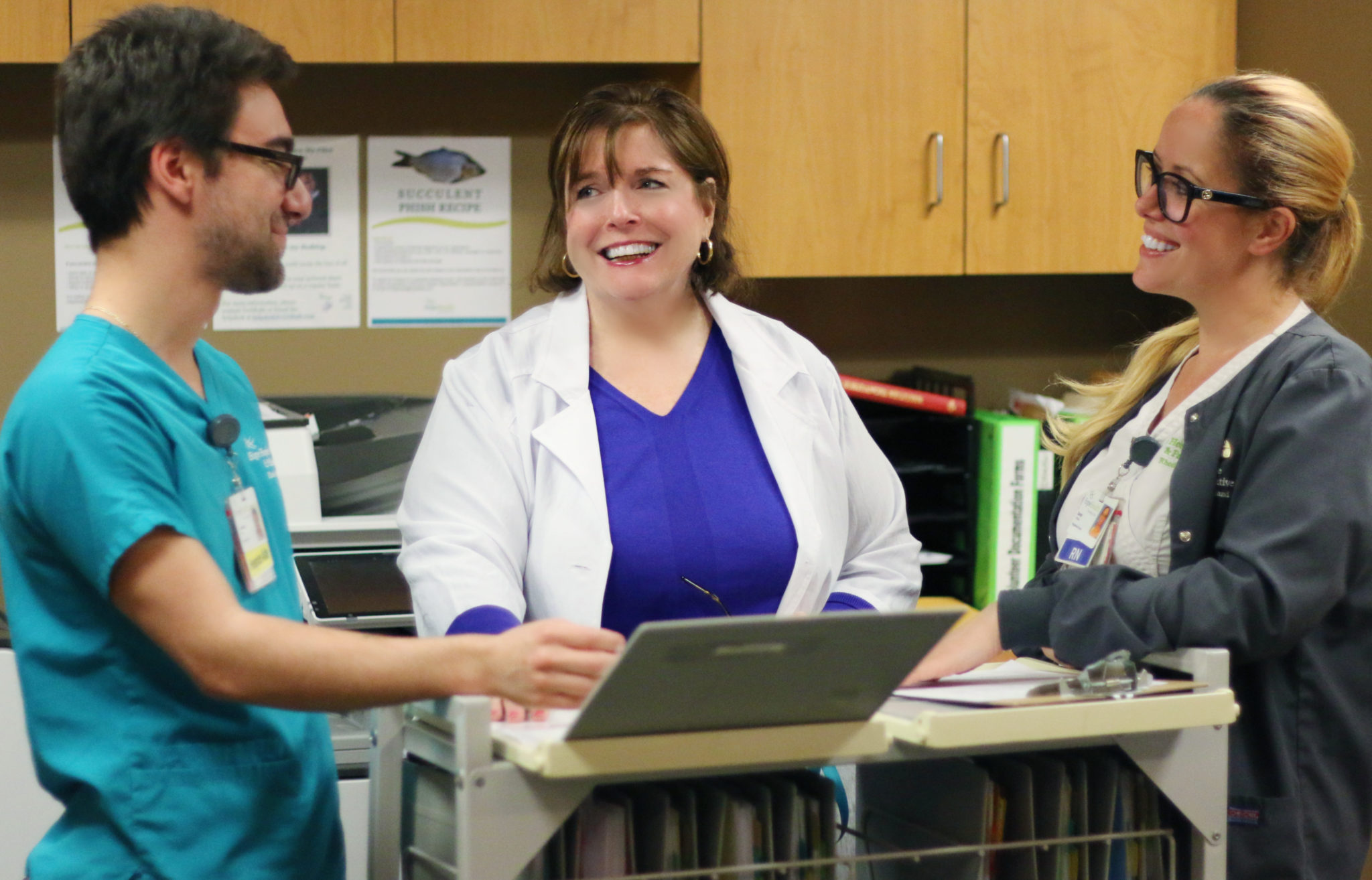With a warm touch and expert care, nurses are there for you in your time of need. That’s why every year, we honor this profession on the birthday of its founder, Florence Nightingale. Starting May 6, health care agencies across the country will celebrate this esteemed profession for National Nurses Week.
At HopeHealth, our home care and hospice nurses play essential roles in providing care to patients and families. Read below to see what makes these specialties at HopeHealth truly special.
Touched by her comfort and guidance, the patient told her, “I’m going to give you this painting so you’ll always think of me.”
Michaela, a home care nurse

When Michaela DiPrete, RN, visits with patients at home, she often breaks the ice by asking about the photographs or belongings she sees.
“I get a snapshot of their lives. I can learn more about them than if they were in the hospital,” she says.
As a palliative care specialist with HopeHealth Visiting Nurse, Michaela sees people with chronic, progressive illnesses like cancer or COPD. Her patients often have quality-of-life issues related to pain, decreased appetite and poor sleep, so symptom management is an important part of Michaela’s work. Caring is another.
“Many times they are searching for answers, for someone to sit with them and be with them, especially if they don’t have a caregiver,” she says.
On a recent home care visit, Michaela met a man who lived alone and was about to start chemotherapy for advanced cancer. Adorning his walls were abstract artworks called pour art, and the man told her he painted them to manage anxiety.
“He opened up that day. He was tearful,” Michaela recalls.
Touched by her comfort and guidance, the man told her, “I’m going to give you this painting so you’ll always think of me.”
Candid chats and caring support are part of the job in palliative care. In visits with new patients, Michaela starts off with a “goals of care” conversation to explain treatments (the benefits and burdens), answer questions and ask the patient what they care about most.
Every patient’s answer is unique. For folks who’ve been in and out of the hospital, some decide their priority is to stay home with family and enjoy the time they have left, “whether it’s months or more than a year,” Michaela explains.
“But not every patient’s goal is to stay at home,” she adds.
Why does Michaela love her job? “I like helping people. Nursing has led me through a number of different avenues, but I found my fit in palliative care.”
“I just felt compelled. I said, ‘I not only want to be a nurse, but specifically I want to be in hospice.’” —Virginia Magnan, RN
Virginia, a hospice nurse manager

Virginia Magnan entered the nursing profession later than most—at age 49. The former YMCA director decided on the career change after experiencing hospice care with her parents.
“I just felt compelled,” she recalls. “I said, ‘I not only want to be a nurse, but specifically I want to be in hospice.’” When people questioned her choice, she’d answer, “If you’ve ever seen a person die with comfort and dignity, you’d understand.”
Today, Virginia is the clinical nurse manager at HopeHealth Hulitar Hospice Center in Providence, Rhode Island. She makes sure everyone on the team—nurses, social workers, aides, chaplains and administrators—works together to provide exceptional care.
“Our goal is to keep patients comfortable, educate families and provide the most peaceful, professional and competent setting for someone to have their last moments of life. It’s very profound, and that’s part of what I love,” she explains.
Some days are tougher than others, but even the hard times are gratifying.
For example, she was particularly moved by the care her team provided to a female patient with children ranging from age 16 to 22, including one with special needs. They were living with their grandmother, and the home was condemned to mold while the mother was in hospice.
“It was a domino effect. The children’s mother was dying of cancer and they didn’t have a place to stay or a hot meal,” Virginia recalls.
Virginia’s team rallied to secure a hotel room, meals and other resources for the children and grandmother. “It was a huge team effort between physicians, nurses, social workers, chaplain and philanthropy,” Virginia says. “We really dug down deep and all of us had a hand in helping them.”
Nurses are special because of their strong balance of clinical and communication skills, says Virginia. They must assess and evaluate, coordinate with physicians, and speak with families about highly sensitive situations.
“We have to communicate with the family at a level they’re comfortable with, in a very gentle and caring and compassionate way. You’re going to guide them through the last moments of their very special loved one’s life. And sometimes the family dynamics are challenging.
“The nurse at the bedside needs to synthesize that and find the appropriate approach for every patient,” Virginia explains.
Even though it’s challenging to help people in their most vulnerable moments, Virginia wouldn’t have it any other way.
“That’s the whole reason to be here; that’s the joy of the job. A lot of people would think it’s strange to say ‘joy’ in a hospice setting, but that’s what it is—it’s joy,” she says.

